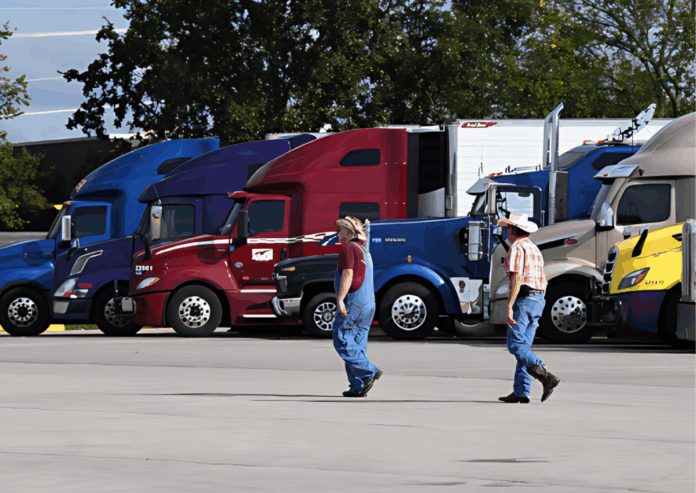What’s This Lawsuit Actually About?
At the center of this case is FMCSA’s final rule issued, which states that non-domiciled drivers — specifically those with temporary legal status such as TPS (Temporary Protected Status), asylum seekers, and refugee status — must now have formal documentation proving authorized status in the U.S. to hold a CDL or CLP (Commercial Learner’s Permit).
The Federal Motor Carrier Safety Administration (FMCSA) claims it’s about “national security” and “system integrity.” But the legal filing, led by Public Citizen and several individual drivers as well as supportive organizations, says it’s something else entirely.
Their argument? That the rule violates the Administrative Procedure Act, oversteps Congress’s intent, and most notably, discriminates against immigrants who are lawfully present but whose documentation might not be continuously renewable.
In short, the suit argues that these actions are illegal as the FMCSA did not follow proper protocol during the rulemaking process by issuing without notice — and doing so without enough justification.
What Is a Non-Domiciled CDL?
Let’s break it down.
A non-domiciled CDL is issued to a driver who’s legally authorized to operate a commercial motor vehicle in the U.S. but does not have permanent status or state-level domicile. This includes categories like:
Refugees or Asylees
DACA recipients (in some jurisdictions)
TPS holders
Immigrants with pending lawful presence decisions
These drivers are legally allowed to work, and for many — trucking has been their path to economic mobility and stability.
FMCSA’s new rule says: if your immigration documentation lapses or cannot be verified in real time through DHS databases, your CDL isn’t valid anymore — no matter how long you’ve been driving, how clean your record is, or how needed you are in the current labor force.
What the Lawsuit Claims
The formal petition, filed in the U.S. Court of Appeals for the D.C. Circuit, argues several key points:
Violation of the Administrative Procedure Act (APA)
The FMCSA didn’t properly weigh the real-world consequences on lawfully present drivers or take into account the barriers many face when renewing documentation on time.
Unlawful Discrimination
The rule disproportionately impacts drivers from war-torn or disaster-affected nations — many of whom fled violence and built a new life behind the wheel.
Congress Didn’t Authorize This
Nowhere in federal law did Congress require FMCSA to take this action. The lawsuit infers DOT appears to be overreaching.
No Evidence of Risk
It presents concern that FMCSA hasn’t shown that these drivers pose any greater risk to highway safety — a key flaw in their “national security” justification.
The Real-World Fallout
This isn’t just a policy squabble — it could strip tens of thousands of drivers from the road.
Already, social media is full of stories from affected families of non-domiciled holders — some of whom saw breadwinners sidelined overnight, with no recourse and no backup plan. There is also, celebration from others, whom feel the roads are that much more safer One impacted driver said in a public post:
“I’ve been paying taxes, running compliant, and working hard for six years. And now, my license is just gone? I didn’t do anything wrong.”
The Precedent This Sets
This case is bigger than just immigration or compliance — it’s about federal overreach vs. human rights.
If FMCSA wins here, it opens the door for immigration status to become a trigger for commercial disqualification, even when no safety violations exist. That could have chilling effects on:
Hiring practices
Fleets may avoid hiring anyone with temporary or changing immigration status — even if they’re legal — just to avoid risk.
Insurance underwriting
Carriers might see higher rates or stricter covenants on fleet composition.
Litigation exposure
If a legally present driver has a lapsed CDL due to federal rule change — who’s liable for loads in transit?
Market Impacts — Let’s Talk Capacity
Here’s where this hits the spot market.
Many of the impacted drivers run under their own authority or lease onto small fleets, contributing directly to market liquidity. If even a portion of these drivers are forced off the road, you’ll likely see:
Short-term tightening of capacity
Spot rate surges in immigrant-heavy markets at first
Ripple effects in seasonal coverage
For carriers, having capacity exit the already flooded market, is actually a favorable outcome.
Final Thought: The Fight Ahead
This lawsuit matters because it tests the balance between policy control and constitutional fairness. And for small carriers, it’s another reminder that compliance and staffing aren’t just HR issues — they’re strategic ones. It was only a matter of time before court challenges began to play out.
Because when the rules change — even quietly — the road ahead changes with it. We will keep an eye out on this and keep you informed.


